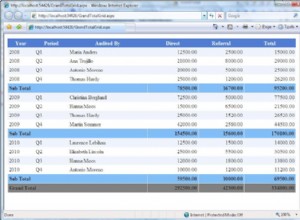Sembra che tutti i casi che causavano lunghi ritardi potessero essere risolti molto più rapidamente tentando una connessione socket diretta come questa:
foreach (string svrName in args)
{
try
{
System.Net.Sockets.TcpClient tcp = new System.Net.Sockets.TcpClient(svrName, 1433);
if (tcp.Connected)
Console.WriteLine("Opened connection to {0}", svrName);
else
Console.WriteLine("{0} not connected", svrName);
tcp.Close();
}
catch (Exception ex)
{
Console.WriteLine("Error connecting to {0}: {1}", svrName, ex.Message);
}
}
Utilizzerò questo codice per verificare se il server risponde sulla porta di SQL Server e tenterò di aprire una connessione solo se lo fa. Ho pensato (in base all'esperienza di altri) che ci sarebbe stato un ritardo di 30 secondi anche a questo livello, ma ricevo un messaggio che la macchina "ha rifiutato attivamente la connessione" su questi immediatamente.
Modifica: E se la macchina non c'è, me lo dice subito anche lui. Nessun ritardo di 30 secondi che riesco a trovare.
Modifica: Le macchine che erano sulla rete ma non sono spente impiegano ancora 30 secondi per fallire, immagino. Tuttavia, le macchine con firewall si guastano più velocemente.
Modifica: Ecco il codice aggiornato. Mi sembra più pulito chiudere un socket che interrompere un thread:
static void TestConn(string server)
{
try
{
using (System.Net.Sockets.TcpClient tcpSocket = new System.Net.Sockets.TcpClient())
{
IAsyncResult async = tcpSocket.BeginConnect(server, 1433, ConnectCallback, null);
DateTime startTime = DateTime.Now;
do
{
System.Threading.Thread.Sleep(500);
if (async.IsCompleted) break;
} while (DateTime.Now.Subtract(startTime).TotalSeconds < 5);
if (async.IsCompleted)
{
tcpSocket.EndConnect(async);
Console.WriteLine("Connection succeeded");
}
tcpSocket.Close();
if (!async.IsCompleted)
{
Console.WriteLine("Server did not respond");
return;
}
}
}
catch(System.Net.Sockets.SocketException ex)
{
Console.WriteLine(ex.Message);
}
}




